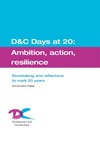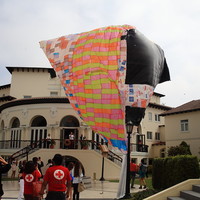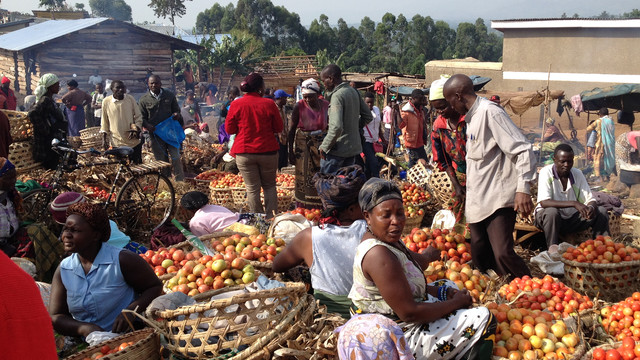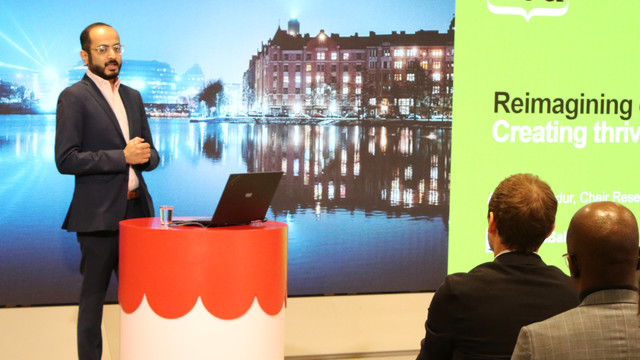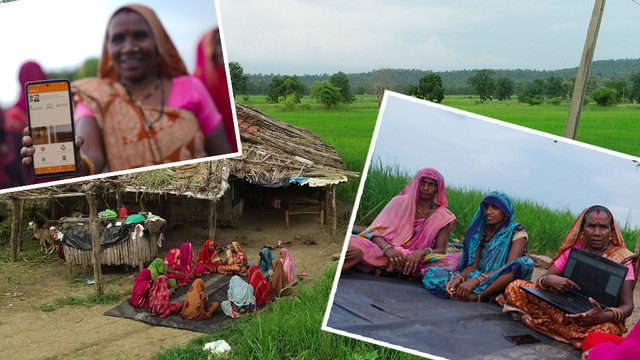Ambition, action, resilience: D&C Days
A new report to mark the 20th anniversary of Development and Climate Days shows how the events have delivered innovation, facilitated challenging conversations and influenced discussions at the annual UN climate change conferences.

The fun factor at D&C Days is crucial, providing valuable connections in the work on climate resilience. In this photo, participants enjoy one of the sessions at the 2017 event in Bonn (Photo: Climate Centre, via Flickr, CC BY-NC 2.0)
For 20 years, the annual Development and Climate Days (D&C Days) event has brought together climate negotiators, grassroots representatives, researchers and development practitioners for open and informal discussions about climate change and development challenges.
Thousands of people have participated in D&C Days to share best practices, explore common problems, ask challenging questions and debate radical solutions.
To mark D&C Days’ 20th anniversary, a special stocktaking report looks at how the event has evolved, highlights how it has fed into international climate negotiations and explores new strategies for the future.
D&C Days is held each year during the Conference of the Parties (COP) to the United Nations Framework Convention on Climate Change (UNFCCC).
Amid the formal UNFCCC negotiations, D&C Days brings together a wide-ranging group of stakeholders for open and honest conversations about climate and development issues and strategies for addressing them.
Innovation and change
The report describes how D&C has evolved: initiated by IIED's Saleemul Huq, it began in 2002 as a one-day ‘Adaptation Day’ event to discuss climate change adaptation during COP8 in Delhi, India. The main aim was to introduce the subject of adaptation into COP discussions – which at that time were heavily focused on climate change mitigation.
A ‘Development Day’ was added to the programme in 2004 in an early move to encourage 'traditional' development practitioners to recognise the threat of climate change and engage with the UNFCCC process.
In 2007, the event was renamed Development and Climate Days to reflect that adaptation had increasingly become mainstreamed into the development agenda – and good adaptation presupposes good development.
Throughout its history, D&C Days has maintained its focus on offering an informal space that fosters open conversations between participants with diverse backgrounds and experiences.
Workshops and activities encourage the participants to work together to explore new ways of thinking. Highlights include creating a hot air balloon made from plastic waste in Lima, a climate change flash mob in Morocco, eating sustainably grown bugs in Paris and a ‘Recipes for Change’ cooking challenge in Katowice. The fun is serious to spark learning, thinking and connections that can deliver transformative change.
A powerful call to action
Since 2017, D&C Days has summed up its aims with a powerful call to action: Global ambition. Local action. Climate resilience for all.
These goals have been reflected in the event programming via five core themes:
- Building resilient agriculture and food systems
- Early warning, early action to leave no one behind
- Financing a resilient future
- Establishing resilient cities and infrastructure, and
- Working with nature to build resilience
The organising partners publish and share key messages from the event to highlight key findings and recommendations for policymakers and practitioners. The report found that this effort, as well as an increasing emphasis on advocacy, have helped to grow the impact of D&C Days and share learning to wider audiences.
How D&C Days has influenced UN climate talks
The report examines how D&C Days has influenced long-term discussions at COP. As an event integrally linked to – but also separate from – the COP process, D&C Days has carved out a unique place for dialogue during COP and has successfully created an environment for sometimes challenging conversations on complex issues.
D&C Days helped to bring adaptation from the margins to the centre of the UNFCCC process. It successfully involved development practitioners, encouraging them to understand climate change as a development issue.
The report notes that providing an energising, informal space during COP – where senior climate negotiators can talk with people on the frontlines of climate change – can have a profound influence on the negotiations during the second week of COP. D&C Days discussions often feed into the high-level talks, and the report highlights numerous convergences between D&C Days themes and COP.
For example, D&C Days has consistently advocated for lesser-heard voices and perspectives to be heard in the UNFCCC process; it has championed representation and equity for those most affected by climate change in least developed countries.
The report also notes that D&C Days was an early proponent of reducing emissions from deforestation and forest degradation (REDD) and linked REDD to sustainable land management and development – which eventually became integral to REDD+.
D&C Days also influenced discussions on loss and damage. As early as 2012, COP negotiators reported to D&C Days about discussions on loss and damage at the formal talks. The report says this early focus and the eventual COP27 breakthrough agreement on loss and damage funding for vulnerable countries suggest an important pathway of influence from discussions at the event to the high-level negotiations.
Partnerships provide new focus
D&C Days has been delivered in partnership with a variety of international organisations, including research organisations, NGOs, UN agencies, multilateral development banks and donors.
The report found that these partnerships have enriched D&C Days in terms of content, delivery and widening thematic focus. For example, in 2012, a new collaboration between IIED, the Red Cross Red Crescent Climate Centre (RCCC), and the Climate and Development Knowledge Network (CDKN) brought a new focus on the humanitarian impacts of climate change.
The most recent event, in 2021, was hosted by a partnership of the RCCC, IIED, the Food and Agriculture Organization of the United Nations (FAO), Global Resilience Partnership, the World Bank and Zurich Flood Resilience Alliance.
During the last decade, D&C Days has become more advocacy and action-focused, with organisers and participants voicing stronger calls for more equitable climate policies.
A gallery of images of various D&C Days events through the years. Click on each image to enlarge it (Photos by IIED, CC BY-NC-ND 4.0 and Red Cross Red Crescent Climate Centre, CC BY-NC 2.0)
Looking ahead
Like many international gatherings D&C Days became an online event after the COVID-19 pandemic. The report found that switching to an online format enabled a broader, more diverse range of stakeholders to participate, thereby helping to address the ongoing challenge of unequal access to COP events.
But the report notes that the online format made it more challenging to achieve one of D&C Days' most valuable and best-loved aspects: its ability to generate authentic, open and frank person-to-person dialogues.
The report suggests that a hybrid format may be the best way to combine the benefits of more equitable access via online participation and the depth of in-person conversations. This would likely require wider partnerships – but also presents possibilities for new connections, wider global inclusivity and broader impact.
D&C Days 20th anniversary is a milestone, and the stocktaking report will help D&C Days explore how to continue to offer a valuable space alongside COP, with unwavering commitment to innovation and ‘serious fun’ that kickstarts lively discussions, fosters instant connections and creates a safe space for exploring bold new ideas.
More information about D&C Days 2023 will be released later this year – in the meantime, read the full report.
